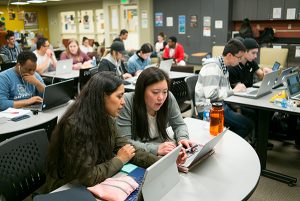
SJSU students partnered with Columbia Law School students during an alternative spring break in which pairs worked to help clients expunge their records for misdemeanor charges. Center, Margaret “Peggy” Stevenson, works with students. (Photo: James Tensuan, ’15 Journalism)
The California State University (CSU) announced its Innovation and Leadership Award recipients on Aug. 28, with Margaret “Peggy” Stevenson from San José State selected as an honoree. Stevenson’s work in creating the SJSU Record Clearance Project was the basis of the award, which honors innovative faculty.
“World-class CSU faculty are leading the charge as our university continues its remarkable progress in improving student learning and degree completion,” said CSU Chancellor Timothy P. White. “These exceptional recipients demonstrate leadership in their respective fields and incorporate cutting-edge techniques into curriculum. Their commitment to student success ensures that the value of a CSU degree continues to increase.”
A selection committee reviewed 366 nominations to identify the one inaugural awardee from each of the CSU system’s 23 campuses.
The Record Clearance Project is a unique program that involves undergraduates in providing legal services, under Stevenson’s supervision. Stevenson, an attorney, started the Record Clearance Project at SJSU in 2008. In 2011 the program was a formalized in three classes in the Justice Studies Department in the College of Health and Human Sciences. Hundreds of students have been involved in what they frequently call “life-changing” work.
Professor Rita Manning, Philosophy, who nominated Stevenson, stated, “As the prelaw advisor at SJSU I strongly recommend this program to all students with an interest in careers in law. They simply will not get an experience like this outside of law school (and many of our students want to work in legal fields that do not involve law school) nor will they have a better opportunity to make such an immediate and positive impact on the lives of people in our community.”
Justice Studies Department Chair James Lee said, “Peggy Stevenson created and manages the most impactful educational experience I have ever seen. Participating students walk away with a deep understanding and appreciation for law, and they take life-long lessons about humanity. I deeply respect Peggy’s dedication to educating our students in this unique, meaningful way.”
SJSU alumnus Earl Cease completed the Record Clearance Project five years ago. According to Cease, “the Record Clearance Project gave me the encouragement I needed to enter law school. Working with our clients and watching their lives change one petition at a time made me believe I have what it takes to make the strenuous journey through law school and become an attorney.” Since passing the bar exam, Cease has volunteered with the Record Clearance Project as a supervising attorney.
Stevenson ran clinics and taught law students for twelve years at Stanford and Santa Clara law schools before starting the Record Clearance Project. Before that, she practiced law in Legal Services offices in Boston, the Los Angeles area and New Jersey. Besides the RCP courses, she also teaches Courts and Society at SJSU.
